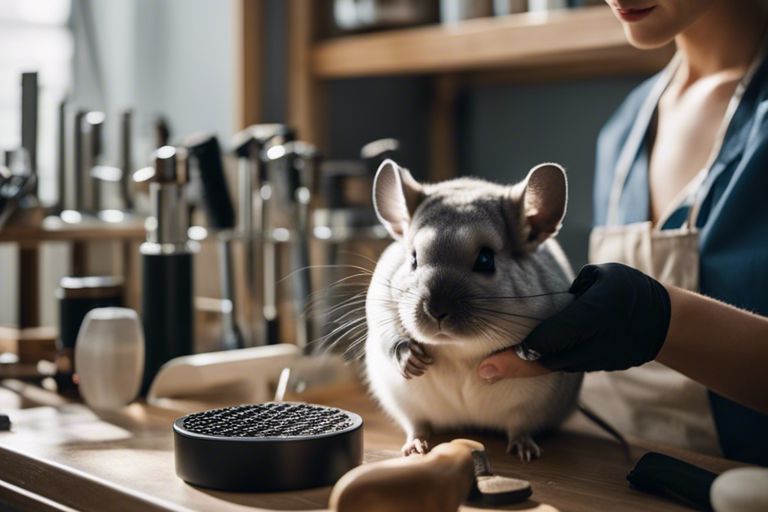Yes, chinchillas require grooming to maintain their health and comfort. Proper grooming prevents fur matting, skin issues, and promotes overall well-being. Below is a comprehensive guide to help you effectively groom your chinchilla.
Key Takeaways
- Regular Dust Baths: Chinchillas need dust baths 2-3 times per week to maintain a healthy coat by removing excess oils and moisture.
- Weekly Brushing: Use a gentle brush weekly to prevent matting and tangling.
- No Nail Trimming: Chinchillas don’t require nail trimming as they naturally keep their nails short through regular activities.

Preparing for Grooming
Gathering Essential Supplies
Gather the following items to ensure a smooth grooming experience:
- Chinchilla-Specific Dust
- Dust Bath Container: A glass jar or dust house works well.
- Fine-Tooth Comb or Chinchilla Comb (optional)
- Soft Cloth (optional): For gently wiping off dust residue.
Creating a Calm Environment
Chinchillas are sensitive animals, so creating a calm environment is essential. Groom in a quiet, dimly lit room to keep your pet relaxed. As crepuscular animals, chinchillas are most active at dawn and dusk, making these times ideal for grooming sessions.
Essential Grooming Techniques
Dust Baths: The Core of Chinchilla Grooming
Dust baths are the primary grooming method for chinchillas, helping to absorb oils and keep their dense fur clean. Do not use water baths, as their fur retains moisture, leading to potential skin infections.
- Frequency: Provide dust baths 2-3 times a week.
- Process: Place 1-2 inches of dust in a suitable container, letting your chinchilla roll for 5-10 minutes.
- Reuse and Replace: Reuse dust if clean, but replace it once it becomes coarse or soiled.
Brushing and Combing
Though dust baths keep most of the coat clean, brushing helps prevent matting, especially for chinchillas with dense fur.
- Frequency: Brush every few weeks or as needed.
- Technique: Use a chinchilla-specific comb or a fine-tooth comb, working gently from the base of the tail towards the head.
- Warning: Avoid using hard brushes, as chinchillas dislike pulling on their fur.
Avoiding Nail Trimming
Chinchillas do not require nail trimming. They naturally wear down their nails on wooden surfaces or during daily activities. If needed, provide wooden surfaces in the cage to support natural nail wear.
Grooming Frequency Table
| Grooming Task | Frequency | Purpose |
|---|---|---|
| Dust Baths | 2-3 times per week | Maintain clean, healthy fur |
| Brushing | Every few weeks | Prevents matting for dense coats |
| Nail Trimming | Not required | Nails are naturally kept short |
| Weekly Health Check | Weekly | Identifies signs of dryness or irritation |
Supporting Coat Health Through Diet
A balanced diet plays a significant role in maintaining coat health. Offer high-quality hay, fresh water, and chinchilla pellets daily. Good nutrition supports fur and skin health and promotes overall vitality.
Monitoring and Addressing Skin Health
Regularly inspect your chinchilla for signs of skin issues:
- Dryness or Flakiness: Adjust dust bath frequency if you observe dry skin.
- Redness or Irritation: May indicate allergies or skin infections—consult a vet if symptoms persist.
- Hair Loss: Often due to stress or improper handling. Minimize stressors and consult a vet if hair loss continues.
Conclusion
Grooming your chinchilla properly is essential for maintaining their health and comfort. Regular dust baths, brushing as needed, and a balanced diet all contribute to a healthy chinchilla. Observe your pet’s coat and skin for any signs of issues, and consult a veterinarian if concerns arise. This routine ensures a happy, healthy life for your furry friend.
FAQ
Q: How often should my chinchilla have dust baths?
A: Chinchillas need dust baths 2-3 times per week to maintain clean, healthy fur.
Q: Is combing necessary for my chinchilla?
A: Combing isn’t essential but can be helpful every few weeks, especially for dense fur coats.
Q: Do I need to trim my chinchilla’s nails?
A: No, nail trimming is not needed. Chinchillas naturally keep nails short through regular activity.
Q: How can I spot skin issues in my chinchilla?
A: Look for dryness, redness, or hair loss during weekly health checks. Consult a vet if issues persist.
